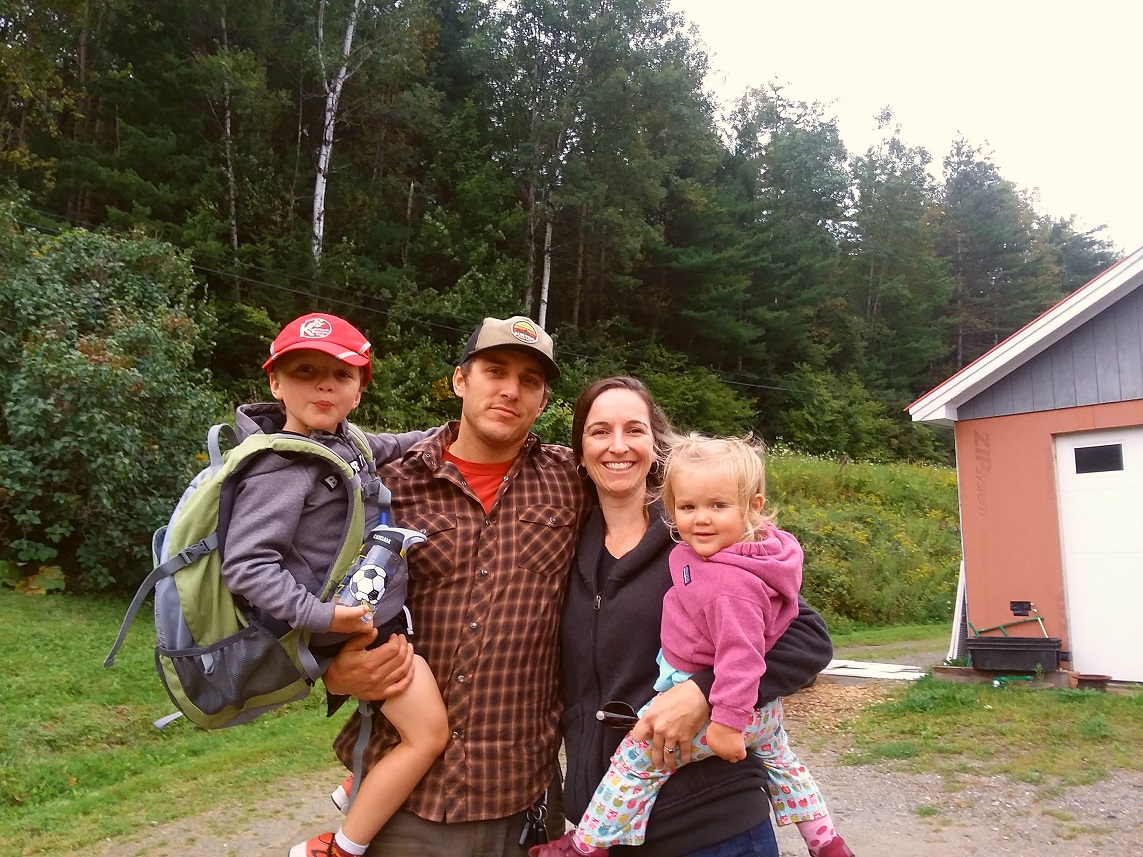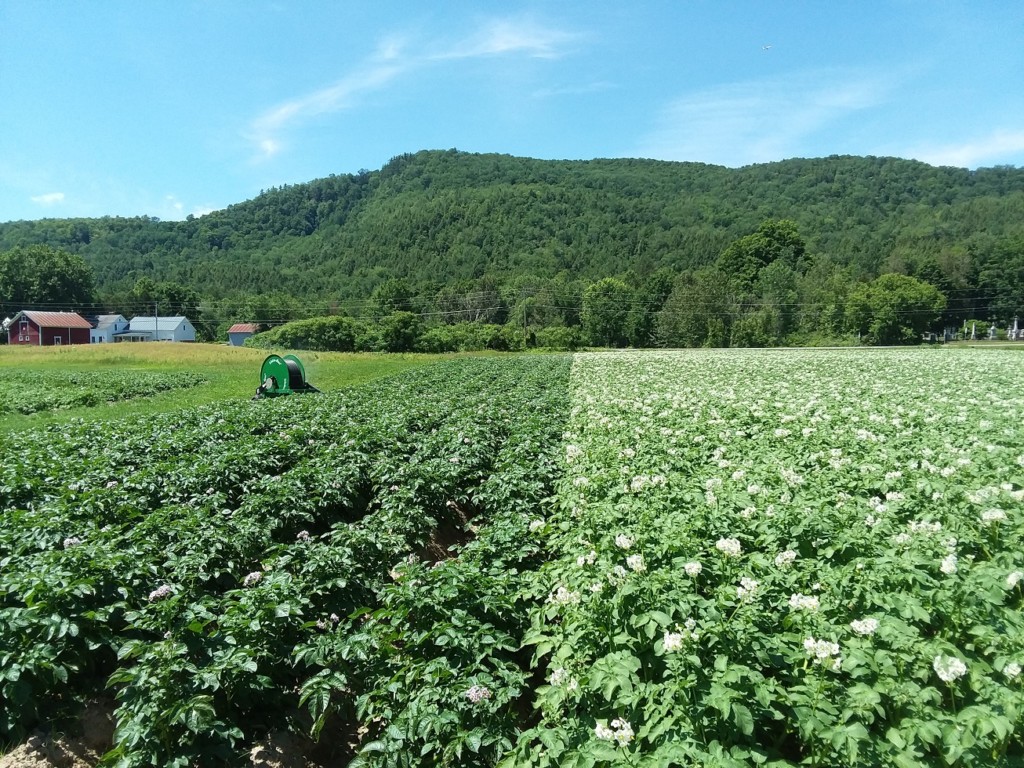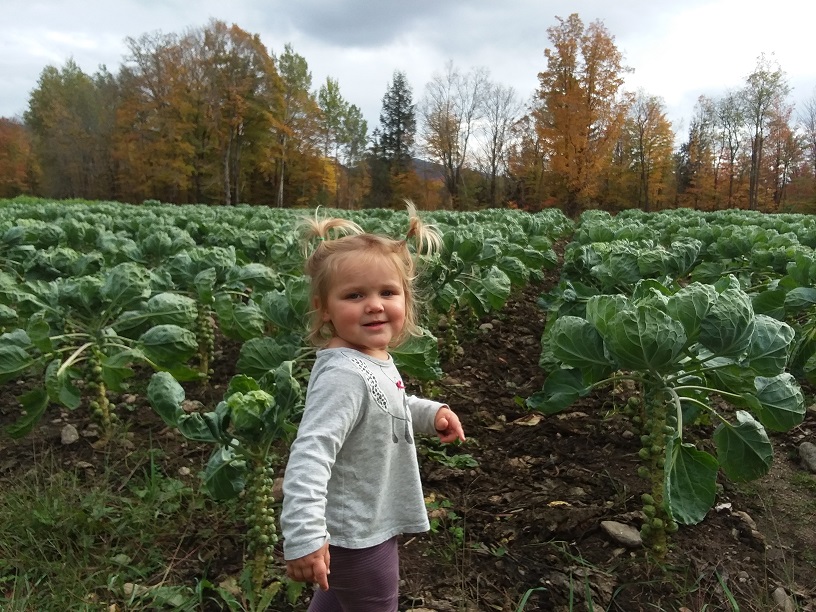The Face of Farming: Root Crops Abound at Burnt Rock Farm
August 10, 2018

By Ellen Kahler
The following is the first installment in Vermont Sustainable Jobs Fund’s Face of Farming Series. The series will profile a variety of farmers throughout Vermont who are employing best practices, implementing innovative approaches and who together represent the evolving face of Vermont’s agricultural system.
Justin Rich has been farming the fertile soils above the Huntington River for a decade. At Burnt Rock Farm Justin focuses on wholesale markets, providing storage crops such as potatoes, sweet potatoes, winter squash and onions directly to City Market, Healthy Living, Farmers to You, the Middlebury Food Coop, the Intervale Food Hub and others.
While selling directly to wholesale markets is relatively standard practice among Vermont vegetable farmers today, this was not the case in 2008 when Justin and his wife Lindsay Lyman-Clarke bought the first part of their now 105-acre farm at a foreclosure auction. At that time most newly-started vegetable farmers got their products to market through farmers’ markets and Community Supported Agriculture (CSA). This more traditional business practice wasn’t going to work for Justin because at the time he was the full-time Farm Manager at Full Moon Farm. “I didn’t have time to stand at a farmers market all day, I had a day job,” reflected Justin as he sat in his office between farm chores and making account calls.

A healthy potato crop coming along. Photo courtesy of Burnt Rock Farm
Justin was also starting the farm business at a time when direct markets were becoming more competitive than in the early years. “The hardest part of farming is figuring out who is going to buy what, when. When we started our farm, CSA and farmers markets were already being served by existing players,” said Justin. The early 2000’s saw an increased demand for local fresh food, and the farmers’ market scene exploded nationally as well as in Vermont with more and more towns setting up their own markets. Farmer’s markets in Vermont have seen significant growth, with the number of markets more than doubling between 1995 and 2018, increasing from 27 to 83.
With a full-time existing job and mature CSA and farmers markets, Justin instead focused his business on selling storage crops directly to wholesalers. It worked. “At that point you could put up a number of storage onions and sell them quickly,” Justin continued.
While the wholesale market has also seen growth over the past 10 years, Justin’s decision to venture into a market that was not as crowded has paid off. Today Burnt Rock Farm employs six full-time employees and provides a wonderful lifestyle for Justin, Lindsay and their two young children, who have ample access to fresh, organic produce and open space to play. The farm has more recently started to grow and sell summer crops such as baby spinach and tomatoes during the warmer months while focusing on growing and selling storage crops during the fall and winter months.

Daughter Mae among the brussel sprouts. Photo courtesy of Burnt Rock Farm
There is no doubt in Justin’s mind that one of the key contributors to his success is the years of work he put in at Full Moon Farm as well as farms in New York. Asked what one piece of advice he would give to those interested in getting into farming he immediately said, “Real life experience on a farm.”
The direct mentorship Justin received from the farmers he worked for before buying his own farm was invaluable. Through these mentorships Justin was able to not only learn about growing vegetables but was able to hone an acute business acumen, a prerequisite to any successful farm business. “Farmer to farmer mentorship is a critical part of any successful farmers’ journey, and the really successful mentorships give younger farmers a deep exposure to the business and management aspects of owning and operating a farm” said Jake Claro, Vermont Sustainable Jobs Fund’s Farm to Plate Director. “The Vermont farm community is a tight knit one and we see farmers teaching younger and less experienced farmers throughout the state.”
Like all farmers, Justin works long days, especially during the summer when he spends 60 to 70 hours a week running and fixing equipment, planting, harvesting and finally prepping the ground for winter. Asked about his favorite aspect of farming, Justin couldn’t identify anything specific, remarking instead, “Over the course of the day I do seven different things so there are many opportunities to get deep satisfaction. There are so many opportunities for positive sensory overload in this type of work. And there are also many opportunities for frustration and heartbreak.”
The Vermont Sustainable Jobs Fund is a nonprofit organization created by the Vermont Legislature in 1995 to partner with state government, private sector businesses, and nonprofits to build a thriving economic, social, and ecological future for Vermont. Learn more about our services, programs, and impacts. VSJF coordinates the Farm to Plate Network, Forests Products Industry Network, and DeltaClimeVT. Learn more at www.vsjf.org and join the conversation on Facebook/VermontSustainableJobsFund.




